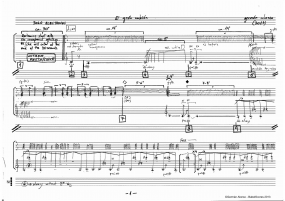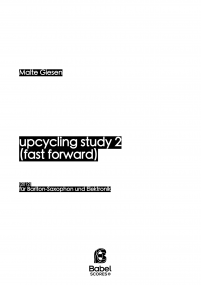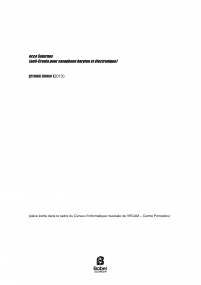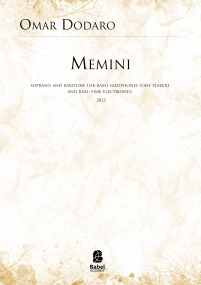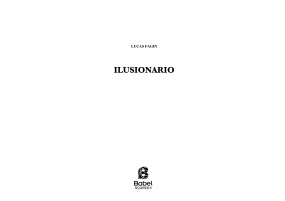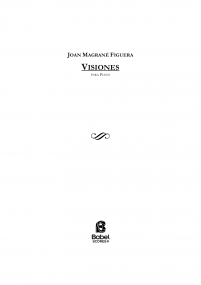El gran cabrón
9,27 €
Version papier (+14,80 € impression et livraison ). Colissimo7-14 days aprox.
Version numérique (+0,00 €) à télécharger
Chez BabelScores, quand vous achetez une partition, vous pouvez ensuite contacter directement le compositeur ici même !
Caractéristiques
Region
Europe
Estimated Duration
6 - 10min
Date
2012
ISMN : 979-0-2325-0746-0
In Stock
Notes sur cette pièce “El gran cabrón” borrows its name from the subtitle of Francisco de Goya’s painting “Aquelarre”, in which a billy goat (cabrón) chairs a witches’ sabbath (aquelarre). This painting is part of the “Black paintings” series, produced at the last Goya’s Spanish residence, “La Quinta del Sordo”, from 1819 to 1823, when he finally exiled to France.
At that time, the Spanish painter had directly experienced the disasters of war during the Spanish Independence war against Napoleon army on the one hand, and he suffered an illness that caused him to go completely deaf, on the other. Both things make possible to understand the context in which these works were conceived, conferring them its characteristic dark and surrealistic ambience.
It’s the idea of monstrosity and deformation that interest me most from these particular paintings. Not only in this particular one, but also in all the series, human faces and bodies are distorted to such an extent that it is not possible to tell its gender, settings belong to unrealistic unidentified worlds and mythological or folkloric situations are turned into macabre scenes (“Saturn devouring his son”, “A pilgrimage to San Isidro”…).
This issue finds its correspondence in music in saturated sound. The use of techniques that produces extremely distorted or noisy sounds and its temporal deployment, connect directly with the idea of monstrosity. The impossibility of establishing a categorization of saturated sounds or recognising the way in which a sound is produced, takes the listener to a new lev“El gran cabrón” borrows its name from the subtitle of Francisco de Goya’s painting “Aquelarre”, in which a billy goat (cabrón) chairs a witches’ sabbath (aquelarre). This painting is part of the “Black paintings” series, produced at the last Goya’s Spanish residence, “La Quinta del Sordo”, from 1819 to 1823, when he finally exiled to France.
“El gran cabrón” borrows its name from the subtitle of Francisco de Goya’s painting “Aquelarre”, in which a billy goat (cabrón) chairs a witches’ sabbath (aquelarre). This painting is part of the “Black paintings” series, produced at the last Goya’s Spanish residence, “La Quinta del Sordo”, from 1819 to 1823, when he finally exiled to France.
At that time, the Spanish painter had directly experienced the disasters of war during the Spanish Independence war against Napoleon army on the one hand, and he suffered an illness that caused him to go completely deaf, on the other. Both things make possible to understand the context in which these works were conceived, conferring them its characteristic dark and surrealistic ambience.
It’s the idea of monstrosity and deformation that interest me most from these particular paintings. Not only in this particular one, but also in all the series, human faces and bodies are distorted to such an extent that it is not possible to tell its gender, settings belong to unrealistic unidentified worlds and mythological or folkloric situations are turned into macabre scenes (“Saturn devouring his son”, “A pilgrimage to San Isidro”…).
This issue finds its correspondence in music in saturated sound. The use of techniques that produces extremely distorted or noisy sounds and its temporal deployment, connect directly with the idea of monstrosity. The impossibility of establishing a categorization of saturated sounds or recognising the way in which a sound is produced, takes the listener to a new level.
Ajouter à une playlist
- Identifiez-vous pour créer une liste
At that time, the Spanish painter had directly experienced the disasters of war during the Spanish Independence war against Napoleon army on the one hand, and he suffered an illness that caused him to go completely deaf, on the other. Both things make possible to understand the context in which these works were conceived, conferring them its characteristic dark and surrealistic ambience.
It’s the idea of monstrosity and deformation that interest me most from these particular paintings. Not only in this particular one, but also in all the series, human faces and bodies are distorted to such an extent that it is not possible to tell its gender, settings belong to unrealistic unidentified worlds and mythological or folkloric situations are turned into macabre scenes (“Saturn devouring his son”, “A pilgrimage to San Isidro”…).
This issue finds its correspondence in music in saturated sound. The use of techniques that produces extremely distorted or noisy sounds and its temporal deployment, connect directly with the idea of monstrosity. The impossibility of establishing a categorization of saturated sounds or recognising the way in which a sound is produced, takes the listener to a new lev“El gran cabrón” borrows its name from the subtitle of Francisco de Goya’s painting “Aquelarre”, in which a billy goat (cabrón) chairs a witches’ sabbath (aquelarre). This painting is part of the “Black paintings” series, produced at the last Goya’s Spanish residence, “La Quinta del Sordo”, from 1819 to 1823, when he finally exiled to France.
“El gran cabrón” borrows its name from the subtitle of Francisco de Goya’s painting “Aquelarre”, in which a billy goat (cabrón) chairs a witches’ sabbath (aquelarre). This painting is part of the “Black paintings” series, produced at the last Goya’s Spanish residence, “La Quinta del Sordo”, from 1819 to 1823, when he finally exiled to France.
At that time, the Spanish painter had directly experienced the disasters of war during the Spanish Independence war against Napoleon army on the one hand, and he suffered an illness that caused him to go completely deaf, on the other. Both things make possible to understand the context in which these works were conceived, conferring them its characteristic dark and surrealistic ambience.
It’s the idea of monstrosity and deformation that interest me most from these particular paintings. Not only in this particular one, but also in all the series, human faces and bodies are distorted to such an extent that it is not possible to tell its gender, settings belong to unrealistic unidentified worlds and mythological or folkloric situations are turned into macabre scenes (“Saturn devouring his son”, “A pilgrimage to San Isidro”…).
This issue finds its correspondence in music in saturated sound. The use of techniques that produces extremely distorted or noisy sounds and its temporal deployment, connect directly with the idea of monstrosity. The impossibility of establishing a categorization of saturated sounds or recognising the way in which a sound is produced, takes the listener to a new level.
Instrumentation
Baritone Saxophone|Real-time electronics|
Recording
Score Details
Format - A4 / US Letter
Pages - 7
Pages - 7


